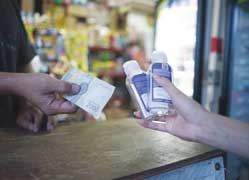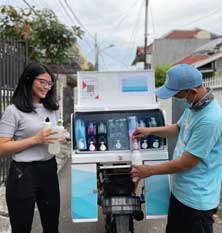Novel ways to reclaim Asia’s “waste” opportunities
Innovations such as refillable solutions to sachets and waste barrier technology to collect plastic waste from rivers are shaping circular goals in Indonesia, which is said to be one of Asia’s largest polluters, according to Angelica Buan in this article
Plastics are “canceledt“
The Covid-19 pandemic has not only halted economic activity, but it has also stalled discussions on major issues such as climate change and waste pollution. Plastics got the break they deserved, morphing from a major polluter to a life-saving material for product packaging, personal protective equipment (PPEs), and single-use medical devices due to their versatility, light weight, sterility, and low cost, particularly in mass production.
However, as pandemic restrictions began to ease around the world, calls to phase out plastics resurfaced. This is not due to a prevalent "canceledt" culture, but to statistics indicating that the environment is already overburdened with plastic waste.
Every year, the world generates over 2 billion tonnes of waste, with 33% of that waste being improperly managed. Currently, only 9% of waste is recycled, which could lead to a waste increase of 3.4 billion tonnes by 2050.
According to World Bank data, high-income countries account for 34% to 683 million tonnes of total global waste, while East Asia and Pacific region and South Asia are expected to generate 602 million tonnes/year and 466 million tonnes/year by 2030, respectively, and rising annually to 18.6% and 41.8%, respectively, by 2050.

Asia, as a consequence of urbanisation and economic growth, has become a crisis zone for plastic pollution. Furthermore, its waste disposal infrastructure has struggled to cope with the growing waste in the region.
Overconsumption of plastic has amplified the current waste management situation, which has caused landfills to overflow, rivers to become clogged, and marine ecosystems to be jeopardised. On the other hand, this jarring situation has prompted markets to explore other plastic material options and technologies that could minimise plastic pollution.
Meanwhile, cooperation and alliances to reduce plastic waste have already been formed; watershed policies, such as the European Union's plastic tax on non- recycled plastic packaging and the US's push to achieve 100% recycling and reuse of plastic packaging by 2040; and the monumental UN Environmental Assembly (UNEA) resolution, which is expected to produce a "legally binding" treaty by 2024, are attempting to turn the tide of plastic pollution.
Breaking away from sachets with refillable solutions
According to the World Economic Forum, Indonesia generates around 6.8 million tonnes/year of plastic waste, a figure that is growing at a rate of 5% per year and could double by 2040 if no action is taken to prevent it.
Alarmingly, much of the waste is mismanaged through open burning, landfilling, or depositing in uncontrolled dumpsites, with a significant portion of it leaking into waterways as a result. While plans have been laid out to increase collection and recycling – which is currently at around 10% – it is believed that innovative solutions can complement planned efforts to achieve a 40% recycling rate by 2040 and eliminate the consumption of more than 1 million tonnes of plastics/year by 2025 by significantly reducing the use of non-recyclable and unsafe degradable plastics and using more plastic-free alternatives.
However, sachets, wrappers, and other single-use multi-material plastic packaging, while still popular among households and retail consumers, pose a problem for recyclers.
These packaging types have little or no value in the recycling market, and collecting those takes time. As a result, informal/private collection sectors and recyclers continue to focus on the highest-value materials, such as post-consumer PET bottles and rigid HDPE containers.
Some businesses have stepped in to offer solutions for delivering products to consumers without the use of these packaging.
Koinpack, a deposit and reward-based returnable and reusable packaging system provider from Zero Waste Living Lab (ZWLL), is a programme of Jakarta-based Enviu. The company claims to have replaced more than 50,600 sachets with its packaging so far.

Original products supplied directly by the producer or distributor of products ranging from home-care to personal-care products are contained in the Koinpack packaging. The easy-to-clean, sterilise, and refill packaging allows for a 24-month shelf life and can be stored at 40°C.
Koinpack's current bottle packaging can be reused up to 20 times before being recycled and made into a brand new bottle. The empty packaging can be returned to a partner outlet or picked up for a cash rebate.
Koinpack bottles must be durable enough to keep the product safe from contamination and spills while also being able to withstand repeated washings. For this reason, and to drive the transition from single-use sachets to reusables, Koinpack partnered with Austrian plastics manufacturer Alpla Group, which has provided Koinpack with 100 ml reusable PET bottles and PP flip-top caps

Siklus (Cycle) is another fast-growing company, collaborating with popular fast moving consumer goods (FCMG) brands such as P&G, Nestlé, Wings, Total Chemindo, Reickitt, Godrej, and Mars Petcare, and providing a similar refillable service to address the rising amount of used sachets in the environment.
Siklus, which was launched in 2019, uses apps and some social media platforms to reach customers and allow them to order products. It brings sachet-free personal care and home cleaning products to customers' homes in mobile refill units, where they can refill the products as much as they want using their own containers. Prices are said to be 5% to 40% lower than those in supermarkets and roadside stalls.
Siklus is launching a pilot project in Labuan Bajo this year, tying up with the Indonesian Waste Platform (IWP) in its bid to reduce plastic waste in Indonesia's Rural & Remote Communities (RRC). IWP has pledged to assist Siklus in expanding its refill business to other rural areas in Maluku, Sumatera, NTT, Bali, Java, and Sulawesi
(PRA)
Subscribe to Get the Latest Updates from PRA Please click here
©2022 Plastics and Rubber Asia. All rights reserved.

©2022 Plastics and Rubber Asia. All rights reserved.
Home Terms & Conditions Privacy Policy Webmail Site Map About Us



















